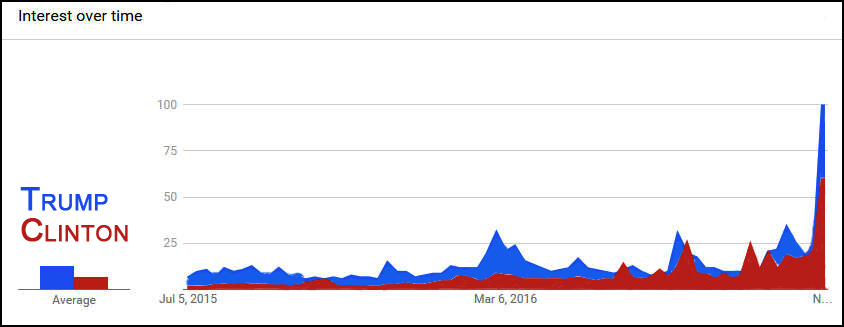bWyse Blog ~ What We're Hooting About!
Below you will find a wealth of Internet Marketing information.
We blog three times per week - check back often for latest and greatest internet marketing information.
In the aftermath of this year’s Presidential Election … is it safe to say that Social Media was able to better predict what the news media pundits could not predict? If we take a look at both social media activity, as well as search trends on Google, will it paint a more accurate representation of American sentiment leading up to the election, than did the political analysts that predicted Hillary had better than an 85% (and as high as 98%) chance of becoming the next President? (New York Times, Huffington Post)

Going back nearly eighteen months, the Google Trends graph reflects that Donald Trump received nearly twice as many searches as did Hillary Clinton. But this is only a count of volume … it doesn’t tell us what the searcher was seeking, or why they were motivated to search in the first place. The many peaks of the graphs can be correlated to the various “hot topics” of the campaign – including debates, audio leaks, email issues, etc. Although the search trends can’t tell us why more people search for information about Donald Trump … it can be concluded that Donald Trump did inspire more people to search than did Hillary Clinton.
Additionally, Professor Li’s (University of Queensland) algorithm analyzes online search and social media taking into consideration sentiment and language used by the candidates – as well as election issues. There were seventeen issues analyzed during the 2016 election, including: immigration, abortion, guns, foreign policy, taxes, gay marriage, health care, economy and jobs, civil liberties, crime and safety, environment, education, budget and spending, national security, Medicare and social security, veterans, and energy. The only social data included were tweets related to the above election related issues. Professor Li’s algorithm not only recognized just how tight the race would be … but it did predict Donald Trump as the winner.
Moreover, Donald Trump’s vast use of Twitter as a means to communicate with Americans served to “trigger viral emotions” and in the end “mattered more than Hillary Clinton’s TV ads” – as explained in a statement Trump made to FoxNews.com. This may have inspired more social activity related to Donald Trump as well as election issues – as compared to activity related to Hillary Clinton.
All things considered, I maintain that future analytics of political pundits will be better served to include the data from search results and social media trends, along with their political polling to arrive at more accurate predictions of election outcomes. In short … social media has more than permeated all aspects of our society, and as such should also be weighted as a valued variable of consideration when predicting sentiments and outcomes of future election predictions.